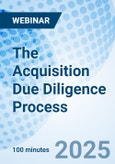Learn how to conduct effective due diligence in mergers and acquisitions to identify key risks, address legal and business issues, and structure deals that minimize liabilities and maximize value.
Mergers and acquisitions of public and private companies are a central component of business operations in the United States. These transactions can be complex, time-consuming, and costly for both the acquiring and target companies, and may lead to disappointment for either party if serious or unanticipated issues arise. The due diligence process is a critical step that enables both sides to fully understand the risks, obligations, and opportunities before completing a deal. This presentation is designed to help participants - particularly those on the buy side - focus on the key issues that enhance each party’s understanding of the transaction and reduce the likelihood of unwelcome surprises.
Learning Objectives
- You will be able to describe the purpose and process of due diligence in mergers and acquisitions, including how it differs for buyers and sellers.
- You will be able to identify key legal, financial, and operational issues to evaluate during due diligence, such as litigation risks, regulatory concerns, and director duties.
- You will be able to explain how due diligence findings influence deal structure, including considerations for mergers, asset acquisitions, and liability avoidance.
- You will be able to discuss the growing importance of environmental, social, and governance (ESG) factors and how they affect due diligence and definitive agreements in regulated industries.
Agenda
The Purpose of Due Diligence
- Know What Is Bought/Sold-Especially as to Risks
- Is There a Difference Depending on Which Side the Diligence Is Conducted (for the Buyer or Seller?)
- Focus on Key Legal and Business Issues
- What Documents Are Needed?
- The Due Diligence Effect on Structure
- After the Deal Closes It May Be Too Late
The Due Diligence Checklist
- What Goes in?
- Who Conducts the Diligence?
- Senior Personnel
- Lawyers/Accountants/Consultants/Paralegals
- What Is the Time Frame?
- The Data Room
Certain Legal Concerns-Standard
- Litigation/Existing or Threatened
- Regulatory Issues
- Personnel/Human Resources
- Director Duties
- SEC Issues
- Stockholder Voting Requirements
The ESG (Environmental, Social, and Governance) Environment
- What Does It Mean?
- Does It Affect the Buyer or Seller?
- How Does It Apply to Regulated Industries Such as Healthcare, Banking, and Communications?
How May It Affect the Definitive Agreement?
Speakers

Michael D. Waters,
Jones Walker LLP- Partner in the Birmingham, Alabama office of Jones Walker LLP
- Practiced securities law for 38 years, representing companies in IPOs, and public companies in secondary offerings, mergers and acquisitions, proxy solicitations, annual and periodic reporting and exempt offerings
- Advised buyers and sellers in approximately 110 bank acquisitions, ranging from small community banks to the acquisition of a $34 billion institution
- Adjunct professor of law at the University of Alabama Law School where he taught banking law for 20 years and has taught mergers and acquisitions for the last 25 years
- Speaks at seminars on a variety of topics involving corporate, securities and bank regulatory issues, and is author of Proxy Regulation, a book published by the Practising Law Institute in New York in 1992 as part of its series on corporate and securities law
- Served as legal advisor to Governor Fob James of Alabama in 1979-1980
- Listed in Chambers USA, Alabama Super Lawyers, The Best Lawyers in America, and the Birmingham Magazine, Top Attorneys
- J.D. degree, University of Alabama School of Law; M.A. degree, Rhodes Scholar, Oxford University; B.A. degree, Duke University
Who Should Attend
This live webinar is designed for attorneys, presidents, vice presidents, CPAs, finance executives, business owners and managers, controllers, real estate brokers, insurance professionals, consultants, and financial planners.









